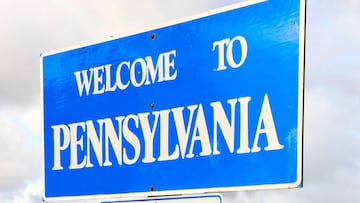Why is Pennsylvania called the keystone state? The importance of this battleground state
The Commonwealth of Pennsylvania has become a rather key state when it comes to elections, but doubts arise about that nickname.


As election results continue to come in, eyes are trained on Pennsylvania, placed as it is as one of the potential presidential deciding swing states. But while it may be key to the election, the moniker “Keystone State” continues to have people questioning its origin.
Well, it’s certainly more than a just a quirky nickname. Instead, it’s rooted in both architecture and history, and points to the state’s pivotal role during America’s founding. Picture a stone archway: at the top is a central stone – yes, you guessed it, the keystone – that holds everything together. Without it, the whole structure collapses. Pennsylvania served a similar function among the original thirteen colonies, linking the North and South and providing political stability that helped keep the young nation on solid ground.
Why is Philadelphia considered America’s birthplace?
Pennsylvania’s central position geographically – spanning the Mid-Atlantic, Northeastern, Appalachian, and Great Lakes regions of the United States – put it right in the middle of the original colonies, but its influence went beyond location. Philadelphia, the state’s largest city at the time, hosted the First and Second Continental Congresses, which coordinated colonial responses to British policies. Then, when it came time to formalise independence, the Declaration was signed there in 1776, cementing Philadelphia’s reputation as the birthplace of America. Not stopping there, Pennsylvania was also the site of the Constitutional Convention of 1787, where delegates hashed out the US Constitution.
Each of these events shaped the fledgling United States, making Pennsylvania’s presence indispensable.
Pennsylvania’s resources
Related stories
The keystone role wasn’t only symbolic. Pennsylvania’s economy supplied resources like coal and iron, which fed industries up and down the Atlantic coast. Its location meant that goods, people, and ideas flowed freely through the state, supporting the economic and political stability essential to the new nation’s survival. In other words, Pennsylvania wasn’t just geographically central – it was a literal keystone in the nation’s infrastructure.
Let’s see how key a role it plays when its ballots are counted.
Complete your personal details to comment